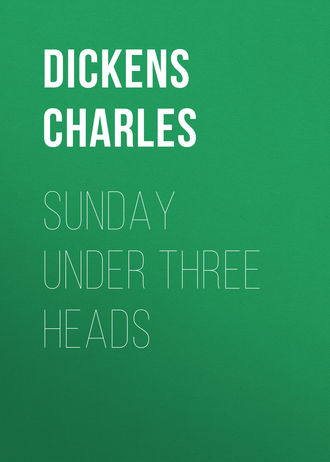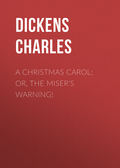
Чарльз Диккенс
Sunday Under Three Heads
DEDICATION
To The Right Reverend
THE BISHOP OF LONDON
My Lord,
You were among the first, some years ago, to expatiate on the vicious addiction of the lower classes of society to Sunday excursions; and were thus instrumental in calling forth occasional demonstrations of those extreme opinions on the subject, which are very generally received with derision, if not with contempt.
Your elevated station, my Lord, affords you countless opportunities of increasing the comforts and pleasures of the humbler classes of society – not by the expenditure of the smallest portion of your princely income, but by merely sanctioning with the influence of your example, their harmless pastimes, and innocent recreations.
That your Lordship would ever have contemplated Sunday recreations with so much horror, if you had been at all acquainted with the wants and necessities of the people who indulged in them, I cannot imagine possible. That a Prelate of your elevated rank has the faintest conception of the extent of those wants, and the nature of those necessities, I do not believe.
For these reasons, I venture to address this little Pamphlet to your Lordship’s consideration. I am quite conscious that the outlines I have drawn, afford but a very imperfect description of the feelings they are intended to illustrate; but I claim for them one merit – their truth and freedom from exaggeration. I may have fallen short of the mark, but I have never overshot it: and while I have pointed out what appears to me, to be injustice on the part of others, I hope I have carefully abstained from committing it myself.
I am,My Lord,Your Lordship’s most obedient,Humble Servant,TIMOTHY SPARKS.
June, 1836.
I
AS IT IS
There are few things from which I derive greater pleasure, than walking through some of the principal streets of London on a fine Sunday, in summer, and watching the cheerful faces of the lively groups with which they are thronged. There is something, to my eyes at least, exceedingly pleasing in the general desire evinced by the humbler classes of society, to appear neat and clean on this their only holiday. There are many grave old persons, I know, who shake their heads with an air of profound wisdom, and tell you that poor people dress too well now-a-days; that when they were children, folks knew their stations in life better; that you may depend upon it, no good will come of this sort of thing in the end, – and so forth: but I fancy I can discern in the fine bonnet of the working-man’s wife, or the feather-bedizened hat of his child, no inconsiderable evidence of good feeling on the part of the man himself, and an affectionate desire to expend the few shillings he can spare from his week’s wages, in improving the appearance and adding to the happiness of those who are nearest and dearest to him. This may be a very heinous and unbecoming degree of vanity, perhaps, and the money might possibly be applied to better uses; it must not be forgotten, however, that it might very easily be devoted to worse: and if two or three faces can be rendered happy and contented, by a trifling improvement of outward appearance, I cannot help thinking that the object is very cheaply purchased, even at the expense of a smart gown, or a gaudy riband. There is a great deal of very unnecessary cant about the over-dressing of the common people. There is not a manufacturer or tradesman in existence, who would not employ a man who takes a reasonable degree of pride in the appearance of himself and those about him, in preference to a sullen, slovenly fellow, who works doggedly on, regardless of his own clothing and that of his wife and children, and seeming to take pleasure or pride in nothing.
The pampered aristocrat, whose life is one continued round of licentious pleasures and sensual gratifications; or the gloomy enthusiast, who detests the cheerful amusements he can never enjoy, and envies the healthy feelings he can never know, and who would put down the one and suppress the other, until he made the minds of his fellow-beings as besotted and distorted as his own; – neither of these men can by possibility form an adequate notion of what Sunday really is to those whose lives are spent in sedentary or laborious occupations, and who are accustomed to look forward to it through their whole existence, as their only day of rest from toil, and innocent enjoyment.
The sun that rises over the quiet streets of London on a bright Sunday morning, shines till his setting, on gay and happy faces. Here and there, so early as six o’clock, a young man and woman in their best attire, may be seen hurrying along on their way to the house of some acquaintance, who is included in their scheme of pleasure for the day; from whence, after stopping to take “a bit of breakfast,” they sally forth, accompanied by several old people, and a whole crowd of young ones, bearing large hand-baskets full of provisions, and Belcher handkerchiefs done up in bundles, with the neck of a bottle sticking out at the top, and closely-packed apples bulging out at the sides, – and away they hurry along the streets leading to the steam-packet wharfs, which are already plentifully sprinkled with parties bound for the same destination. Their good humour and delight know no bounds – for it is a delightful morning, all blue over head, and nothing like a cloud in the whole sky; and even the air of the river at London Bridge is something to them, shut up as they have been, all the week, in close streets and heated rooms. There are dozens of steamers to all sorts of places – Gravesend, Greenwich, and Richmond; and such numbers of people, that when you have once sat down on the deck, it is all but a moral impossibility to get up again – to say nothing of walking about, which is entirely out of the question. Away they go, joking and laughing, and eating and drinking, and admiring everything they see, and pleased with everything they hear, to climb Windmill Hill, and catch a glimpse of the rich corn-fields and beautiful orchards of Kent; or to stroll among the fine old trees of Greenwich Park, and survey the wonders of Shooter’s Hill and Lady James’s Folly; or to glide past the beautiful meadows of Twickenham and Richmond, and to gaze with a delight which only people like them can know, on every lovely object in the fair prospect around. Boat follows boat, and coach succeeds coach, for the next three hours; but all are filled, and all with the same kind of people – neat and clean, cheerful and contented.
They reach their places of destination, and the taverns are crowded; but there is no drunkenness or brawling, for the class of men who commit the enormity of making Sunday excursions, take their families with them: and this in itself would be a check upon them, even if they were inclined to dissipation, which they really are not. Boisterous their mirth may be, for they have all the excitement of feeling that fresh air and green fields can impart to the dwellers in crowded cities, but it is innocent and harmless. The glass is circulated, and the joke goes round; but the one is free from excess, and the other from offence; and nothing but good humour and hilarity prevail.
In streets like Holborn and Tottenham Court Road, which form the central market of a large neighbourhood, inhabited by a vast number of mechanics and poor people, a few shops are open at an early hour of the morning; and a very poor man, with a thin and sickly woman by his side, may be seen with their little basket in hand, purchasing the scanty quantity of necessaries they can afford, which the time at which the man receives his wages, or his having a good deal of work to do, or the woman’s having been out charing till a late hour, prevented their procuring over-night. The coffee-shops too, at which clerks and young men employed in counting-houses can procure their breakfasts, are also open. This class comprises, in a place like London, an enormous number of people, whose limited means prevent their engaging for their lodgings any other apartment than a bedroom, and who have consequently no alternative but to take their breakfasts at a coffee-shop, or go without it altogether. All these places, however, are quickly closed; and by the time the church bells begin to ring, all appearance of traffic has ceased. And then, what are the signs of immorality that meet the eye? Churches are well filled, and Dissenters’ chapels are crowded to suffocation. There is no preaching to empty benches, while the drunken and dissolute populace run riot in the streets.
Here is a fashionable church, where the service commences at a late hour, for the accommodation of such members of the congregation – and they are not a few – as may happen to have lingered at the Opera far into the morning of the Sabbath; an excellent contrivance for poising the balance between God and Mammon, and illustrating the ease with which a man’s duties to both, may be accommodated and adjusted. How the carriages rattle up, and deposit their richly-dressed burdens beneath the lofty portico! The powdered footmen glide along the aisle, place the richly-bound prayer-books on the pew desks, slam the doors, and hurry away, leaving the fashionable members of the congregation to inspect each other through their glasses, and to dazzle and glitter in the eyes of the few shabby people in the free seats. The organ peals forth, the hired singers commence a short hymn, and the congregation condescendingly rise, stare about them, and converse in whispers. The clergyman enters the reading-desk, – a young man of noble family and elegant demeanour, notorious at Cambridge for his knowledge of horse-flesh and dancers, and celebrated at Eton for his hopeless stupidity. The service commences. Mark the soft voice in which he reads, and the impressive manner in which he applies his white hand, studded with brilliants, to his perfumed hair. Observe the graceful emphasis with which he offers up the prayers for the King, the Royal Family, and all the Nobility; and the nonchalance with which he hurries over the more uncomfortable portions of the service, the seventh commandment for instance, with a studied regard for the taste and feeling of his auditors, only to be equalled by that displayed by the sleek divine who succeeds him, who murmurs, in a voice kept down by rich feeding, most comfortable doctrines for exactly twelve minutes, and then arrives at the anxiously expected ‘Now to God,’ which is the signal for the dismissal of the congregation. The organ is again heard; those who have been asleep wake up, and those who have kept awake, smile and seem greatly relieved; bows and congratulations are exchanged, the livery servants are all bustle and commotion, bang go the steps, up jump the footmen, and off rattle the carriages: the inmates discoursing on the dresses of the congregation, and congratulating themselves on having set so excellent an example to the community in general, and Sunday-pleasurers in particular.
Enter a less orthodox place of religious worship, and observe the contrast. A small close chapel with a white-washed wall, and plain deal pews and pulpit, contains a closely-packed congregation, as different in dress, as they are opposed in manner, to that we have just quitted. The hymn is sung – not by paid singers, but by the whole assembly at the loudest pitch of their voices, unaccompanied by any musical instrument, the words being given out, two lines at a time, by the clerk. There is something in the sonorous quavering of the harsh voices, in the lank and hollow faces of the men, and the sour solemnity of the women, which bespeaks this a strong-hold of intolerant zeal and ignorant enthusiasm. The preacher enters the pulpit. He is a coarse, hard-faced man of forbidding aspect, clad in rusty black, and bearing in his hand a small plain Bible from which he selects some passage for his text, while the hymn is concluding. The congregation fall upon their knees, and are hushed into profound stillness as he delivers an extempore prayer, in which he calls upon the Sacred Founder of the Christian faith to bless his ministry, in terms of disgusting and impious familiarity not to be described. He begins his oration in a drawling tone, and his hearers listen with silent attention. He grows warmer as he proceeds with his subject, and his gesticulation becomes proportionately violent. He clenches his fists, beats the book upon the desk before him, and swings his arms wildly about his head. The congregation murmur their acquiescence in his doctrines: and a short groan, occasionally bears testimony to the moving nature of his eloquence. Encouraged by these symptoms of approval, and working himself up to a pitch of enthusiasm amounting almost to frenzy, he denounces sabbath-breakers with the direst vengeance of offended Heaven. He stretches his body half out of the pulpit, thrusts forth his arms with frantic gestures, and blasphemously calls upon The Deity to visit with eternal torments, those who turn aside from the word, as interpreted and preached by – himself. A low moaning is heard, the women rock their bodies to and fro, and wring their hands; the preacher’s fervour increases, the perspiration starts upon his brow, his face is flushed, and he clenches his hands convulsively, as he draws a hideous and appalling picture of the horrors preparing for the wicked in a future state. A great excitement is visible among his hearers, a scream is heard, and some young girl falls senseless on the floor. There is a momentary rustle, but it is only for a moment – all eyes are turned towards the preacher. He pauses, passes his handkerchief across his face, and looks complacently round. His voice resumes its natural tone, as with mock humility he offers up a thanksgiving for having been successful in his efforts, and having been permitted to rescue one sinner from the path of evil. He sinks back into his seat, exhausted with the violence of his ravings; the girl is removed, a hymn is sung, a petition for some measure for securing the better observance of the Sabbath, which has been prepared by the good man, is read; and his worshipping admirers struggle who shall be the first to sign it.






